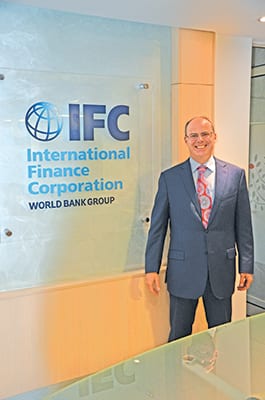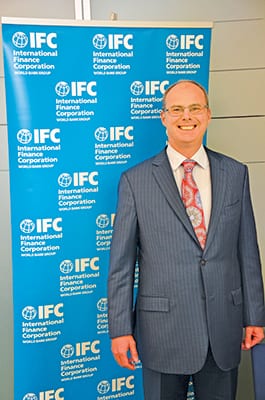The IFC is actively engaged in helping Serbia improve its business and investment climate, the insolvency framework and debt resolution, and to attract private investments in infrastructure through public-private partnerships and concessions
We spoke with Mr Thomas Lubeck, IFC Regional Manager for Central and South-East Europe, about the current status of Serbian reforms and IFC’s scope of work in the country.
From the end of the crisis to this day, the Western Balkan region has attracted a noticeably lower level of foreign investment (FDI) than the countries of central Europe. In your opinion, what is the main reason for the region’s failure to be attractive to investors?
– The Western Balkan region is lagging behind the countries of Central Europe in terms of FDI. The stock of FDI in manufacturing on a per capita basis in Serbia is two to three times behind most countries in Central Europe. The same is true when we look at the overall FDI stock.
FDI in Serbia exhibited a downward trend prior to the financial crisis but has since performed better than some comparators in the Western Balkans, when taken as a percentage of GDP.
What is also interesting about Serbia is that the source country of its FDI has diversified, in particular from the UAE and China. The Russian Federation has been the source of some important historical investments in energy, though FDI from EU countries still makes up a strong majority, at 60 per cent.
In terms of the sector-based composition of FDI, around three-quarters of total FDI has been to “non-tradable” sectors, primarily telecoms, banking and retail, while only one quarter to “tradable” sectors, most of this to manufacturing. This skew has an impact, as non-tradable sectors largely target the domestic market and thus have limited growth potential and a limited effect on competitiveness.
What Serbia and other Western Balkan countries need is more export-orientated FDI, especially in higher domestic value-added production. FDI of this nature is difficult to attract and is heavily dependent on a favourable and predictable business environment.
Serbia and other Western Balkan countries need more export-orientated FDI, especially in higher domestic value added production
What direction should the region’s countries take to get out of the trap of a constant race to the bottom in labour costs and increasing subsidies for foreign investors?
– The countries of the Western Balkans need to continue improving their investment climate. The outlook for the region’s growth is improving, but it remains far below its potential. From our perspective, structural issues need to be accelerated. The challenges are remarkably similar across the countries: bloated state budgets, state-owned enterprises (SOEs) competing with or replacing the private sector, ineffective administration and bureaucracy. These lead to suboptimal private investment, high formal unemployment and low labour market participation.
I see most of the constraints as being in the space of the investment climate and the low efficiency of the public sector, to the extent that countries are not finding ways to bring capital and improved efficiency to the public sectors. We often talk about infrastructure, because without strong and efficient infrastructure it is hard to build a basis for other sectors of the economy. We can also talk about the need for improved connectivity, for physical and institutional linkages, among the countries themselves and towards the EU and the rest of the world.
How much do you think foreign investors, in cooperation with international institutions, have contributed to improving the business environment?
– For several years now, the highest levels of the Serbian Government have signalled that they would like to try and implement a wide range of reforms in the business environment.

This effort is driven to increase employment and economic prosperity for the citizens of Serbia and is also intertwined with the country’s goal of EU membership.
The response from a wide range of international institutions has been to engage and provide as much support as possible. International institutions are working with the Serbian Government and business in numerous areas, such as fiscal consolidation, tax administration, e-Government, judicial reform, financial reporting standards etc.
Several years ago, Serbia set up a task force intended to improve the business environment and the Doing Business Rankings, headed by Deputy Prime Minister Zorana Mihajlović. This high-level commitment has definitely yielded some results, with Serbia ranking among the global top 10 improvers in this year’s edition of the Doing Business Report. Serbia still has a lot of scope for improvement, but the clear signals from the Serbian President and Prime Minister are also encouraging.
In this context how do you see the influence of the Foreign Investors Council?
– As being indispensable. Since it was established in 2002, the Foreign Investors Council in Serbia has been a strong promoter of FDI in the country and an important channel for communicating necessary reforms for improving the overall business environment to the Government of Serbia.
The FIC’s activities complement the IFC’s activities to encourage sustainable development through the private sector. I’m a big fan of the FIC White Book, which, alongside our Doing Business Report, provides essential guidance for the development of the private sector in Serbia.
What structural reforms should give Serbia an advantage and where can they rely on the expertise of the IFC?
– There are three critical areas of structural reform where the IFC is actively engaging to help Serbia improve efficiency. First is the business and investment climate. We can help the Government of Serbia to reduce the burden businesses face through streamlining licenses and permits, reducing costs, and helping to increase transparency through the online issuance of licenses and permits.
We are particularly excited about the Prime Minister’s efforts to establish systems to offer a wide range of business-related permits and services online.
Lower levels of Government and SOEs often oppose reforms. Important political decisions need to be made about how to support those segments of society
Another important area is improving the insolvency framework and debt resolution. Serbia still suffers from high NPL rates, which take up banks’ management time and effort.
Finally, the IFC has a specialised transaction advisory service that helps governments attract private investment into infrastructure through public-private partnerships (PPPs) and concessions.
In that light, how do you see your cooperation with the City of Belgrade?
– The City of Belgrade is one of the IFC’s strongest partners. Since the start of the new administration three years ago, the IFC has been working closely with the City to realise its vision for improving services and quality of life for Belgrade’s inhabitants.

The IFC has several advisory mandates and is considering direct financing of several projects.
The IFC is advising the City on how to structure and implement PPPs for large infrastructure projects in water and sanitation. PPPs are an agreement between the City and a specialised private company, where the City pays the private company to deliver municipal services. The private company is selected through a competitive tender on the basis of its expertise, experience and cost-efficiency.
This arrangement enables the City to tap into world-class know-how at a competitive price, resulting in improved services for citizens, and to mobilise private sector financing, thus reducing the direct impact on the City’s budget. The City chose this arrangement to develop a modern waste-to-energy project in Vinča, with an estimated investment size of €300 million. The IFC will continue advising the City of Belgrade on water and sanitation PPPs until completion.
You recently announced the IFC’s specific willingness to help privatise largest state-owned enterprises. Why has so little changed?
– The IFC can support the Government in privatising state-owned enterprises, either in an advisory capacity or by financing the acquisition by the investor. We would like to see any privatisation happen through a competitive and transparent tender.
Since the start of the new administration three years ago, the IFC has been working closely with the City of Belgrade to realise its vision for improving services and quality of life for Belgrade’s inhabitants
Progress in privatising SOEs has sometimes been difficult because this is a sensitive political topic in Serbia. SOEs have been the source of large amounts of employment to politically influential, unionised employees. The most difficult cases are those SOEs that require large subsidies from the budget in order to continue operating. This is no longer financially sustainable.
The IFC is especially active in the banking sector, where it has made certain progress in reducing problematic loans, though their level remains high. Do you see the key to this problem is insufficient banking expertise, or in the generally weak condition of a local business?
– At the end of June 2017, NPLs accounted for 16.8% of total loans, representing the lowest level since January 2011, and a sharp decrease from 23% in mid-2015, when the Government’s NPL Resolution Strategy was adopted. A relatively recent asset quality review of 14 banks in Serbia revealed that none of the banks participating in the review had a capital adequacy ratio below the regulatory minimum of 12%, but there was a need for further re-classification and adjustment.
Banks would like to do more lending, but they are often unable to find suitable creditworthy borrowers. At the same time, borrowers are apparently also reluctant to take loans when the economy and their businesses are not growing.
In general, the framework for the resolution of NPLs and preventing new NPLs from happening needs to be improved. There is a lack of judicial and administrative practice in restructuring and bankruptcy. I would also say that there is a cultural bias on the part of borrowers not to communicate with banks and restructure to address cash-flow problems early enough.
The banks would much prefer to restructure and keep the company as a going concern rather than go through bankruptcy. The IFC has been trying to improve the overall framework and related issues through our Western Balkans Debt Resolution Project. This project has supported the strengthening of the bankruptcy regulatory framework via drafting amendments to the current Law on Bankruptcy, aligned with IMF requirements.